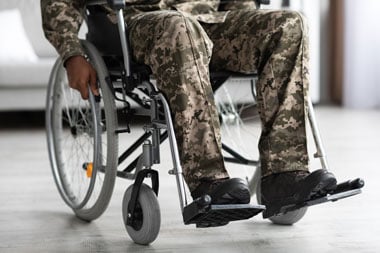Our Disability Law Firm Will Fight For You
Veterans in Northeastern Ohio who are disabled as a result of injury or disease incurred or aggravated during active military service should never be denied benefits promised by the U.S. government. You fought for our country. You should not have to fight with our country’s VA bureaucrats. Contact our veterans disability lawyers in Ohio today.
Heller, Maas, Moro & Magill Co., LPA, helps disabled armed services veterans obtain the Veterans Administration (VA) benefits they are entitled to. We know the system. We’ll take up the fight to make it work for you. We are a disability benefits law firm staffed with experienced veterans benefits lawyers who are longtime residents of the Mahoning Valley. We care about the needs of our clients, whom we consider neighbors, and we fight aggressively for them. We have the resources and determination necessary to guide you through this confusing process.
Are You A Disabled Veteran Who Qualifies For VA Benefits?
According to veterans disability law, the Veterans Administration, or U.S. Department of Veterans Affairs, (VA) is supposed to compensate veterans who have suffered service-connected disabilities. Benefits are available to veterans who have not been dishonorably discharged from any branch of the armed services.
Ohio veterans may obtain Disability Compensation if their physical disability is:
- Caused by a service-related injury or illness
- Rated at 10 percent or more as a single disability
Veterans who have suffered a mental disability also qualify for Disability Compensation if:
- The mental disorder is service-connected
- The veteran cannot work because of a mental disorder
- The VA has not granted the veteran a 100 percent disability rating
The disability may have been incurred during active duty or active duty for training, or inactive duty training. For a veteran on inactive duty for training, the disability must have resulted from an injury, heart attack or stroke.
The veteran’s degree of disability rating (determined in 10 percent increments) dictates the amount of the monthly benefit, which is tax-free. Benefits may be combined and paid for multiple disabilities and, if the veteran has dependents, an additional allowance may be added if the combined disability is rated 30 percent or more.
In addition:
- Special Monthly Compensation (SMC) is an additional tax-free payment for veterans, their spouses, surviving spouses, and parents. For veterans, SMC is a higher rate of compensation paid due to special circumstances, such as the need of assistance for daily life activities, or a specific disability, such as loss of the use of a hand or leg. For spouses and surviving spouses, this benefit is commonly referred to as “aid and attendance” and is paid based on the need for assistance from another person to perform daily life activities.
- Dependency and Indemnity Compensation (DIC) is a tax-free payment generally made to a surviving spouse, child, or parent of a veteran who died while on active duty, active duty for training, or inactive duty training or survivors of veterans who died from their service-connected disability. DIC for parents is an income-based benefit.
The VA provides additional housing and insurance benefits to veterans with disabilities, including:
- Adapted Housing Grants to help buy or construct a home adapted for the vet’s disability, or to modify an existing home to accommodate a disability.
- Service-Disabled Veterans’ Insurance, including permanent plans and term insurance with a maximum face value of $10,000.
- Veterans’ Mortgage Life Insurance.
There are also several special claims available to disabled veterans. They include a one-time allowance to buy a new or used car or other adaptive equipment to accommodate a service-connected disability, and a convalescence benefit, which is temporary 100 percent disability compensation rating to recover from surgery or immobilization of a joint by a cast without surgery. A temporary 100 percent disability compensation rating is also available to a veteran who is hospitalized for more than 21 days for a service-connected disability.
The Ohio veterans’ disability benefits attorneys of Heller, Maas, Moro & Magill Co., LPA, can help you understand all of the benefits you may qualify for and receive for your service and sacrifice. Once you are a client of ours, your veterans disability claim file may remain open with us to ensure you can continue to obtain benefits you or your family members qualify for.
Unable To Work Due To A Service-Connected Disability?
In some cases, a veteran may receive VA benefits at the 100 percent disability rate without obtaining a 100 percent disability rating. The additional payment is typically granted when the disability has significantly interfered with the vet’s ability to work or has caused frequent hospitalization.
Individual Unemployability benefits may be paid to a veteran who is unable to maintain substantially gainful employment as a result of service-connected disabilities and who has:
- At least one service-connected disability rated at 60 percent or more
-or-
- Two or more service-connected disabilities, at least one of which has a rating of 40 percent or more, and combined have a rating of 70 percent or more.
The VA says Individual Unemployability benefits may be granted “under exceptional circumstances.” Like all VA disability benefits, the veteran’s application must include relevant service and medical records – including service, veterans’ and civilian treatment — that provide evidence of the disability and achieve the required rating.
VA Disability Claims Require Numerous Records
When filing for disability benefits, the veteran is responsible for submitting all relevant evidence he or she possesses and/or providing information sufficient to enable VA to obtain all relevant evidence the vet does not have.
In a standard claim, the VA will get relevant records from any federal agency the vet adequately identifies and authorizes the VA to obtain records from. To make its decision, the VA may require the vet to undergo a medical examination or obtain a medical opinion from a doctor who previously treated the veteran.
In the Fully Developed Claims Program (FDC), the veteran submits all records he or she has and certifies that they have no further evidence to back up their claim. The vet then has up to a year to amend the claim.
The FDC is intended to allow the VA to expedite claims processing by reducing the time the VA spends seeking non-federal records like private medical files or federal records the vet possesses. If there is a piece of relevant evidence missing from the vet’s claim, the VA will obtain it and process the claim the traditional (slower) way.
Regardless of the type of VA disability benefits claim, the records that may be required are numerous, including:
- Military personnel records, including the DD-214, deployment orders, pay records, medals and certificates
- Social Security Administration (SSA) records
- VA Medical Center records
- Public Health Service records (Substance Abuse and Mental Health Services Administration, SAMHSA)
- Private doctors’ medical records
- Federal workers’ compensation (OWCP) records
- Veteran’s personal statement
- Statements from the veteran’s friends and family with knowledge of the injury/illness and its impact.
Helping Disabled Vets With Benefits Claims And Appeals
Unfortunately, beyond providing what records you have, your initial claim for VA disability benefits is mostly in the hands of the VA. The best you can do to ensure how well your claim supports your qualification for benefits is to make sure your private/civilian medical records accurately describe the nature and extent of your disabling condition.
Because of the backlog of claims and appeals pending with the VA, there is often a lengthy wait for the results of an initial claim review (even in the FDC program). If a decision denies benefits, the veteran may pursue three stages of appeal:
- Filing a Notice of Disagreement and seeking a review of the initial application by the local VA office.
- Appealing to the Board of Veterans’ Appeals
- Appealing to the U.S. Court of Appeals for Veterans’ Claims.
Veterans generally have one year after the VA denies a claim to file a notice of an appeal.
Each appeal requires gathering and presenting new evidence and testimony in hearings that are increasingly formal. A VA lawyer may cross-examine the veteran. Veterans fare better with help from a VA disability benefits lawyer who knows the system and understands what’s required to successfully appeal a rejected claim.
Obtaining VA Benefits For Disabled Veterans
At Heller, Maas, Moro & Magill Co., LPA, we have taken up the duty of ensuring that totally disabled veterans and their families in Northeastern Ohio get all of the Veterans Administration benefits they have been promised for their sacrifice. It’s unfortunate that the process for obtaining this much-needed assistance is so complex, but we know how to get it done. We can provide this service to you.
Request A FREE Consultation About VA Benefits
Our attorneys do not get paid a fee unless you get paid benefits. Let our lawyers get you the benefits you deserve as a disabled vet. Call Heller, Maas, Moro & Magill Co., LPA or send us an email, for a free consultation in Youngstown, Salem, Warren, Kent or Akron today.
I applied for benefits and have been denied, now what?
You can appeal a denial through a Notice of Disagreement. You have 1 year from the date of your denial to file.
So, why do I need a veterans benefits attorney?
The appeals process can be tedious and complex. An attorney can help you through the process and be sure all of your rights are entirely protected.
How does my attorney get paid?
Our fees are on a contingency basis, meaning we only get paid if your claim gets approved. We get our fee through a percentage of your past-due benefits.
I am a veteran, what type of benefits may I be eligible for?
The Veterans Benefits Administration offers a number of benefits for veterans that includes pensions, education and training, home loans, and disability compensation. Our office can assist you in your pursuit of disability compensation.
What makes me eligible for disability compensation?
In order to obtain disability compensation, a veteran must meet four essential elements: A veteran must A.) meet service requirements, B.) have a disabling condition that could be the result of an illness or injury that occurred while in service, C.) be currently suffering from the ongoing disabling condition, and D.) prove a link between the current disabling condition and the illness or injury that occurred while in service. In some cases, you may also qualify for Social Security Disability benefits.
How can I apply for benefits?
A veteran can apply for benefits either at the local VA office or electronically at www.ebenefits.va.gov.

